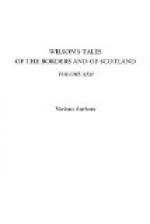The teller gave his head a significant shake. If he had had a tail to shake, and had shaken that tail, it would have been much the same.
Having got the money, he was more than ever under the law of that proclivity, on the broad line to ruin, on which so many young men take stations; and still retaining his, he went at the hour of the hot joints, to dine at the Rainbow, where he met many others, in that refreshment house, of the same class, who, like himself, considered—that is, while the money was there—that guineas in the purse supersede the necessity of having ideas in the head. He took to such liquid accompaniments of the dinner, as would confirm the resolution he had formed, of paying at once his debt of honour. And why not? Was not he of that world whose code of laws draws the legitimate line of distinction between debts contracted to industrious tradesmen for the necessaries of life, and those which are the result of whim, pride, or vindictiveness? All recollections of the flaying of the bird, and of the lady’s adjuration to heaven, had given way to the enthusiasm of the noble feeling to obey the dictates of that eternal and immutable code of honour. And by seven o’clock he was at Stewart’s, where he found Hamilton and Cameron waiting for their respective “pounds of flesh.”
“Here is the L5,” cried Hamilton, as he entered; and, throwing the note upon the table, “it is for the gull trick.”
“And here,” responded the West Indian, “is your L100 for the woman trick.”
And he cast from him the bundle of notes, with a grandeur of both honour and defiance. “But I have a reservation to make. Campbell has not reported to me the issue of his commission; and if it shall turn out that the woman retracts, I will reclaim the money.”
“And get it too,” said the other, laughing sneeringly, as he counted the notes. “But here comes Campbell.”
“Campbell,” cried Cameron, as his debtor entered, “I want my L10 to pay Nightingale.”
“Ask Dewhurst,” said Campbell. “I have been cheated by him. He told me a lie. The woman speaks true, and I shall be revenged.”
“I have nothing to do with Dewhurst,” answered Cameron. “You are my debtor; and if I don’t get the money to-night—you know my lodgings—the club will decide upon it to-morrow.”
And, throwing a withering look upon his old friend—a word now changed for, and lost in that expressive vocable, debtor—he hurried out, followed by Hamilton, who had both his money and his revenge, and wished to be beyond the reach of a recall.
Left to themselves, the two remaining friends of the hour before, but now no longer friends, looked sternly at each other. The one considered himself duped; the other was burning under the imputation of being a cheat and a liar.




